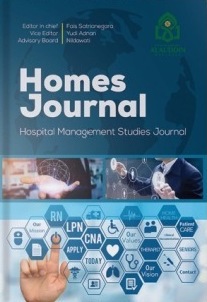PSYCHOSOSIAL FACTORS ON THE PERFORMANCE OF HEALTH OFFICERS
Abstract
Background:Psychosocial factors have become a major concern in occupational health. Changes that occur in the labor market, namely increased globalization, competition, flexibility, and new forms of work organization.
Objective:The purpose of this study was to describe the psychosocial factors on the performance of health workers in Puskesmas X Makassar City.
Method:This research method is a descriptive quantitative research with a population of all health workers at Puskesmas X Makassar City as many as 55 people using total sampling. The collected data were then analyzed by univariate and bivariate.
Result:The results of data analysis showed that the majority of health workers at Puskesmas X Makassar City experienced severe stress as much as 50.9%, heavy loads as much as 65.5%, and mild fatigue as much as 67.3% with optimal good quality performance. This illustrates that health workers experience psychosocial factors that have a positive impact on performance, and to produce good performance.
Conclusion:It is necessary to create a psychosocial environment so that individuals feel comfortable in groups and organizations, showing high productivity and improving the quality of work.
References
Adnan, Y. (2020). Effectiveness of Nursing Caring Behavior to The Satisfaction of Hospital Patients in Puskesmas Wotu. Afiasi: Jurnal Kesehatan Masyarakat, 5(3), 88–95.
Casmiati, A. F., & Haryono, A. T. (2015). Pengaruh job demand dan kecerdasan emosional terhadap kinerja dengan burnout sebagai variabel moderating pada karyawan rumah sakit banyumanik semarang. Journal of Management, 1(1).
Dewi, F. M. R. (2012). Hubungan Beban Kerja Dan Lama Masa Kerja Dengan Stres Pada Perawat Di Ruang Perawatan 2 RSUD RA. Basuni Gedeg Mojokerto. Medica Majapahit (Jurnal Ilmiah Kesehatan Sekolah Tinggi Ilmu Kesehatan Majapahit), 4(1).
Houdmont, J., Kerr, R., & Addley, K. (2012). Psychosocial factors and economic recession: the Stormont Study. Occupational Medicine, 62(2), 98–104.
Khuzaeni, M. I., & Djumahir, S. (2013). The Influence of Work Culture, Work Stress to the Job Satisfaction and Employees Performance in the State Treasury Service Office in Jakarta, Indonesia. IOSR Journal of Business and Management, 9(2), 49–54.
Malard, L., Chastang, J.-F., & Niedhammer, I. (2015). Changes in psychosocial work factors in the French working population between 2006 and 2010. International Archives of Occupational and Environmental Health, 88(2), 235–246.
Mallapiang, F., Alam, S., & Suyuti, A. A. (2016). Faktor yang berhubungan dengan kelelahan kerja pada perawat IGD di RSUD Haji Makassar Tahun 2014. Al-Sihah: The Public Health Science Journal, 8(1).
Mollart, L., Skinner, V. M., Newing, C., & Foureur, M. (2013). Factors that may influence midwives work-related stress and burnout. Women and Birth, 26(1), 26–32.
Mosadeghrad, A. M. (2013). Occupational stress and turnover intention: implications for nursing management. International Journal of Health Policy and Management, 1(2), 169.
Niedhammer, I., Chastang, J.-F., Sultan-Taïeb, H., Vermeylen, G., & Parent-Thirion, A. (2013). Psychosocial work factors and sickness absence in 31 countries in Europe. The European Journal of Public Health, 23(4), 622–629.
Notoadmojo, S. (2007). Metode Penelitian Kesehatan. Rineka Cipta.
Nugraeni, R. (2014). Hubungan Antara Role Overload Dengan Stres Kerja Pada Perawat. Universitas Muhammadiyah Surakarta.
Ouyang, Y. (2009). The mediating effects of job stress and job involvement under job instability: Banking service personnel of Taiwan as an example. Journal of Money, Investment and Banking, 11(1), 16–26.
Perry, C. M., Sheik-Nainar, M. A., Segall, N., Ma, R., & Kaber, D. B. (2008). Effects of physical workload on cognitive task performance and situation awareness. Theoretical Issues in Ergonomics Science, 9(2), 95–113.
Perwitasari, D., & Tualeka, A. R. (2014). Faktor yang Berhubungan dengan Kelelahan Kerja Subjektif Pada Perawat di RSUD DR. Mohommad Soewandhi Surabaya. The Indonesian Journal of Safety, Health And Environment, 1(1), 15–23.
Robbins, S. P., & Judge, T. A. (2013). Organizational behavior (Vol. 4). New Jersey: Pearson Education.
Thio, T. L. M. (2016). Hubungan Antara Stres Kerja, Iklim Kerja, Hubungan Kerja dengan Beban Kerja Perawat di Rawat Inap Rumah Sakit Bethesda GMIM Tomohon. Paradigma, 4(1).


